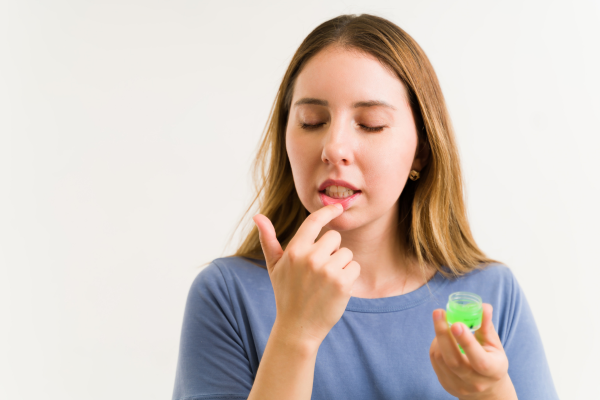Dry mouth, or xerostomia, occurs when your mouth doesn’t produce enough saliva to stay properly moist. While it can be a minor inconvenience during the day, experiencing dry mouth at night can disrupt your sleep, leading to discomfort, throat irritation, and even oral health issues. Fortunately, there are practical steps you can take to prevent dry mouth at night for better sleep. In this blog, we’ll explore seven effective tips to help you address this problem. Let’s dive in!
Throughout the Day
One of the best ways to prevent dry mouth at night is by keeping your body well-hydrated. Dehydration significantly contributes to decreased saliva production, especially as your body rests. Make sure you:
- Drink 8-10 glasses of water daily.
- Avoid diuretics such as caffeine, alcohol, or sugary drinks, which can lead to dehydration.
- Incorporate water-rich foods into your diet, like fruits and vegetables.
Proper hydration throughout the day ensures that your body has enough fluids to keep your mouth moist during the night, helping you avoid discomfort and sleep interruptions.
-
Use a Humidifier in Your Bedroom
Using a humidifier in your sleeping space is a simple yet effective solution. Dry air can worsen mouth dryness, especially during colder months when heaters are in use. A humidifier adds moisture to the air, preventing your nasal passages and mouth from becoming dry.
- Place the humidifier near your bed to maximise its benefits.
- Clean it regularly to avoid bacteria or mold buildup.
A moist environment not only keeps your throat and mouth hydrated but also promotes better breathing while you sleep.
-
Avoid Alcohol and Caffeine before Bedtime
Both alcohol and caffeine are known to reduce saliva production. If you enjoy a cup of coffee or a glass of wine, try to consume them earlier in the day. Instead, opt for:
- Water or herbal teas like chamomile or peppermint.
- Decaffeinated drinks if you need a warm beverage in the evening.
By cutting back on alcohol and caffeine before bedtime, you reduce the chances of waking up with a dry mouth, ensuring uninterrupted, restful sleep.
-
Practice Good Oral Hygiene
Good oral hygiene plays a crucial role in preventing dry mouth at night for better sleep. Brushing, flossing, and using mouthwash regularly help keep your mouth clean and healthy, which supports better saliva production.
- Brush your teeth with fluoride toothpaste twice a day.
- Floss daily to remove food particles that can dry out your mouth.
- Use alcohol-free mouthwash to avoid worsening mouth dryness.
Incorporating these practices into your nightly routine will not only prevent dryness but also keep your breath fresh.
-
Chew Sugar-Free Gum or Lozenges
Chewing sugar-free gum or sucking on lozenges can stimulate saliva production. This can be especially helpful right before bedtime if you often experience dryness during the night. Choose products containing xylitol, as it helps prevent tooth decay while keeping your mouth moist.
- Keep sugar-free gum by your bedside for emergencies during the night.
- Use xylitol-based lozenges that are safe for oral health.
Stimulating saliva naturally is one of the best ways to prevent dry mouth at night, ensuring that your mouth stays moist as you sleep.
-
Review Medications with Your Doctor
Certain medications, such as antihistamines, antidepressants, and blood pressure drugs, are known to cause dry mouth as a side effect. If you suspect your medication might be contributing to the problem, consult your doctor or pharmacist. They may:
- Adjust your dosage or switch to an alternative medication.
- Recommend specific treatments to counteract the dryness.
If dry mouth persists and disrupts your sleep, it’s essential to address the underlying cause with a healthcare professional. For medical advice, consider visiting a private GP in London for a prompt consultation.
-
Breathe Through Your Nose, Not Your Mouth
Mouth breathing is one of the most common causes of dry mouth at night. When you breathe through your mouth, especially while sleeping, it accelerates moisture loss. To correct this:
- Use nasal strips or decongestants to keep your nasal passages open.
- Try nasal breathing exercises to train yourself to breathe through your nose.
- Consult a doctor if you have chronic congestion or sleep apnea.
Training yourself to breathe through your nose is a long-term solution that not only prevents dry mouth at night but also improves your overall respiratory health.
Conclusion
Dry mouth at night can severely impact your sleep quality and oral health, but it is manageable with the right approach. Staying hydrated, maintaining good oral hygiene, using a humidifier, and managing your medications are all practical ways to address the problem. Additionally, being mindful of your breathing habits and avoiding alcohol or caffeine before bed can significantly improve your nighttime comfort.
If your dry mouth persists or becomes more severe, it’s crucial to consult a healthcare provider. You can visit gp.london for a same-day consultation to get personalised medical advice and explore further treatment options.
